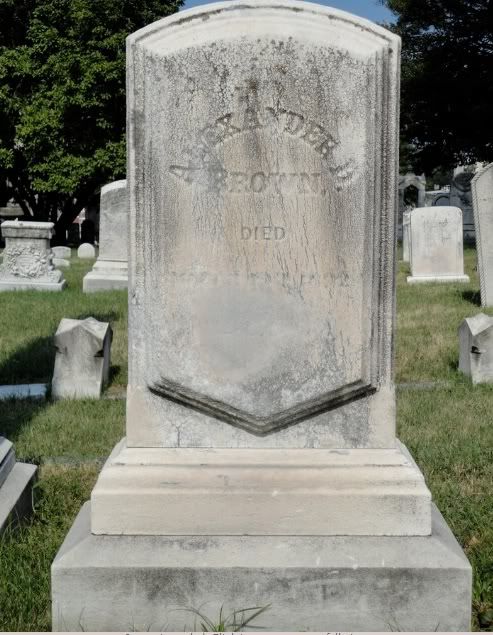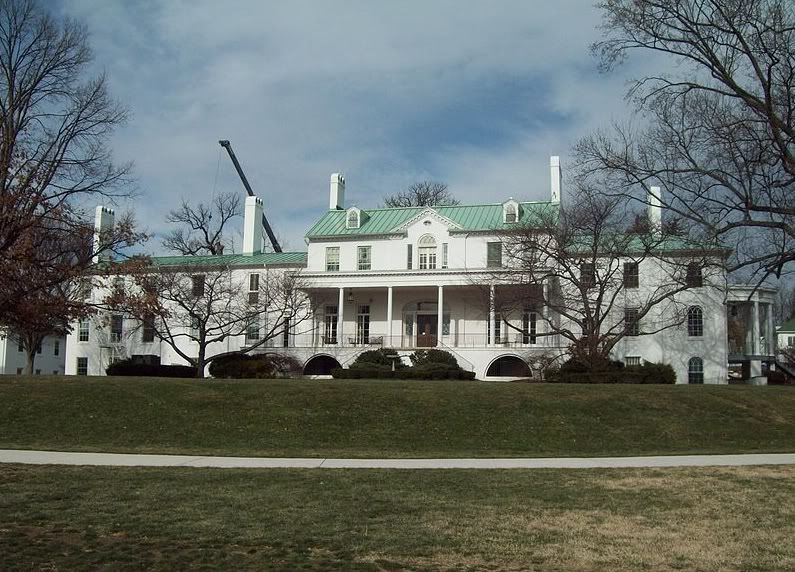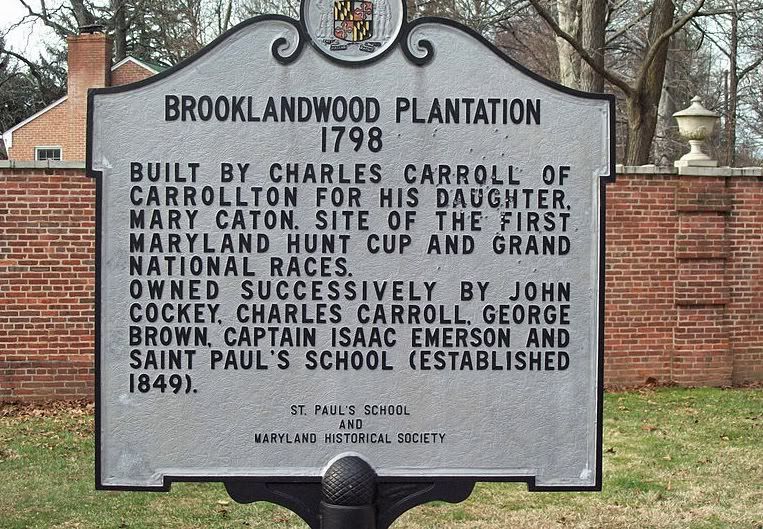This might have been the best obituary ever. Alexander Brown was the patriarch of a large family of bankers that settled here in Baltimore in the early 1800s and started Alex Brown and Sons. Some of them migrated to New York and started a bank called Brown Brothers. When I was doing some research on another one of my posts I stumbled upon this March 21, 1892 New York Times obituary of
Alexander Davison Brown who died on March 20 of 1892 and was grandson of the bank's founder.
Alexander Brown’s Death - An Old Age Made Miserable By An Unwise Marriage
Baltimore, March 20 1892 -- Alexander Brown seventy-three years died here to-day. He was a member of the well-know family of bankers, but was outlawed from society on account of his marriage to Laura Hobson. This woman was the daughter of his father’s lodge keeper. Brown fell in love with her and would have married her then, but she disappeared, and when next he met her she was the leader of the local demi-monde.
He persuaded her to marry him, and the result was the greatest scandal in the history of Baltimore Society. He took his bride to his magnificent country place, Brooklyn Wood, in the midst of the most aristocratic neighborhood of the State, and there, with convivial spirits, big celebrations and orgies were held. The match resulted in cross-suits for divorce. Mr.Brown won the case, but the woman Hobson got $3,000 a year and kept her dower rights. Those rights will now yield her from one to two hundred thousand dollars.
Mr. Brown was accomplished, but, unlike his family, which represents much of what is best in the life of the city, he had no taste for business, and his gay career made for him a very miserable old age.
Glossary
Demi-monde - refers to a group of people who live hedonistic lifestyles, usually in a flagrant and conspicuous manner. Such behaviors often included drinking or drug use, gambling, high spending (particularly in pursuit of fashion, as through clothing as well as servants and houses), and sexual promiscuity. The term demimondaine referred to a woman who embodied these qualities; later it became a euphemism for a courtesan or prostitute.
Dower Rights - Dower rights are the rights that a non owner spouse has in the real property of his or her spouse. It was originally set up when the husband was the only real property owner. It was designed to allow the non-owner wife to make sure that if her husband sold their home without her permission she would still have some protection in the value of the real property, so that if the husband later died, she could claim the one third of the value of her right to live in the home or the value of income produced by any farm, rental or other real property that he owned for the rest of her life.
Who were these people?
If you want learn more about the Alexander Brown family history, the Boston Library has a very white-washed version of the
Brown Family History here. There is no mention of the Laura Hobson scandal in it. However, the descendants of William Brown had the decency to put together a
more inclusive family tree here.
From these two sites we learn that Alexander Davison Brown, the dead guy in question, was born on May 30, 1823 and in 1843 married his first wife, Colgate Die Nisbet. We also learn that Colgate was much older than Alexander Brown. One record says she was born in 1812 another 1800. Either way, Colgate Nisbet died on March 30, 1879. We don't know much about Laura Hobson, all we learn is that she married Alexander Brown in August 1880. A check of the Baltimore Sun archives makes no mention of the nuptials and ensuing honeymoon orgy, but there is a notation that in Baltimore County in 1868 that a Laura Hobson was charged for keeping a bawdy house. She was found not guilty.
Bawdy House - A brothel; a house of prostitution.
Where did the Honeymoon orgy take place?
I was curious about this Brookland Wood home so
I googled it. The estate is now the
St. Paul School for Boys in of all places, Brooklandville, MD. This is an expensive private school that wouldn't be worth mentioning other that the ghost of Alexander and Laura Brown must have had an impact on the young lads that attend. In 2001 Baltimore society was aghast that a St. Pauls School lacrosse player video taped himself having sex with a girl from another private school, and then showed the video tape to the rest of the St. Paul Lacrosse Team. The mansion looks like this today, notice the sign doesn't mention Laura, Alexander or the honeymoon orgy:
So how did well did Laura Hobson make out?
The body of Alexander Davison Brown is barely cold, but that doesn't stop Mrs. Brown nee Hobson from rushing into court on March 24, 1892 with her lawyer demanding her cut. We learn more from this
New York Times blurb
Alexander D. Brown’s Estate - Looking out for his former wife’s interest.
Baltimore - March 24, 1892 - Oliver F. Hack, counsel for Mrs. Laura J. Brown, as given notice of his intention to apply for letter of administration on behalf of Mrs. Brown as the widos of Alexander D. Brown of Brookland Wood, if the latter left a will, and to cite the late Mr. Brown’son George to bring the will into court. Alexander d. Brown, who was buried last Tuesday, married the daughter of his father’s lodgekeeper after she had become well known in Baltimore.
Mrs. Brown was granted a divorce a mensa-et-thoro form her husband, by the Baltimore County Court, July 9, 1891. Her former husband was to pay her $3,000 a year “during their joint lives”. The decree of court says that “nothing in the decree or in the granting of the divorce shall operate to release or extinguish the defendant’s right of dower in the real estate of Mr. Brown, nor any of her marital rights in his property if she should survive him.” Mr Hack declares that Mr.Brown had only a life estate at Brookland Wood, and that at his death the estate went to his son, George Brown.
Mr. Brown, he said,owned personal property of about $30,000 and also a ducking shore for which he had been offered $50,000. According to law, Mr. Hack stated, Mrs. Brown would be entitled to about one-fourth or one-fifth of this property. Mr Hack further said that George Brown, father of Alexander D. Brown, had provided in his will that the widows of his sons and grandsons should receive annuities of $6,000 a year during their lifetimes. This $6,000 a year, Mr. Hack said, would now by virtue of the will, have to be paid to Laura J. Brown.
Mensa et thoro -- Legal process by which married couple may formalize a de facto legal separation while remaining legally married.
|
If you wish to confront Alexander Davison Brown about his moral character or get some tips on energizing your social life, you may visit him at Green Mount Cemetery in Baltimore. Look for him at the Brown family plot at N39.30846 W76.60607. It's on the left hand side as you go up the hill right past the entrance way. |

|



